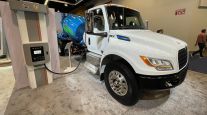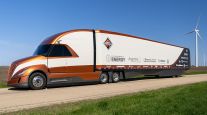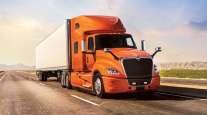Senior Reporter
Navistar, GM Cooperate on Fuel Cell System for Class 8 in 2024
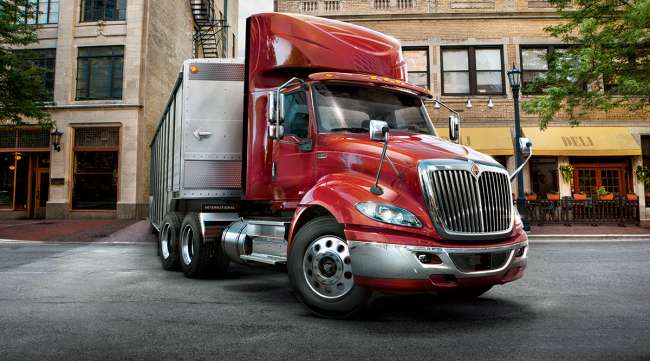
[Stay on top of transportation news: Get TTNews in your inbox.]
Navistar Inc. announced it intends to produce a zero-emission longhaul truck using fuel cell systems supplied by General Motors and will have an International RH Series FCEV model commercially available in 2024.
J.B. Hunt Transport Inc., a longtime Navistar customer, will deploy some of the trucks in a pilot program beginning next year.
“At Navistar, we are mindful that the next generation of trucks will be an important piece of an ecosystem solution, and zero-emissions vehicles do not take a one-size-fits all approach,” CEO Persio Lisboa said. Navistar also is developing battery-electric trucks.
GM has 50 years of experience with fuel cells, Lisboa said, and is a “perfect partner on the industrial side, with global leadership in the space.”
The RH Series FCEV will have a target range of 500-plus miles and a hydrogen fueling time of less than 15 minutes, according to the Lisle, Ill.-based truck maker.
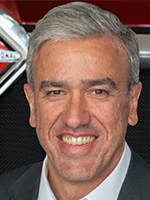
Lisboa
The truck will get its energy from two GM Hydrotec fuel cell power cubes. Each cube contains 300-plus hydrogen fuel cells along with thermal and power management systems.
At the same time, Navistar took a minority stake in OneH2, a privately held company based in Longview, N.C., that will supply the needed hydrogen production, storage and delivery.
OneH2 plans to kick-start substantial hydrogen heavy-duty truck refueling infrastructure using its modular, scalable production units.
OneH2’s hydrogen strategy has seen “great success” at warehouses to power forklifts, Lisboa said. “We have come up with a model that we believe can be highly successful, which is this decentralized way of distributing hydrogen at an affordable cost that can be expanded as demand grows.”
That approach would allow its fuel cell trucks to travel as unrestricted as diesel trucks do today, he added.
J.B. Hunt Transport Inc., a unit of Lowell, Ark.-based J.B. Hunt Transport Services Inc., will operate an as yet unspecified number of the trucks in 2022 as part of a pilot program along dedicated routes and evaluate the fueling infrastructure, likely to be located at its customers’ sites.

J.B. Hunt Transport Services ranks No. 4 on the Transport Topics Top 100 list of the largest for-hire carriers in North America, and No. 4 on the TT Top 50 list of the largest logistics companies in North America.
J.B. Hunt Transport Chief Operating Officer Nick Hobbs said, “We have over 521 unique locations across the U.S. that we could deploy them to. We have a lot of flexibility as we roll this out.”
Lisboa called Navistar’s approach to bringing a hydrogen fuel cell heavy-duty truck to market “probably the most integrated solution that is in North America.”
During an online media roundtable, Lisboa declined to disclose the financial arrangements with GM, calling the relationship a “technology development partnership.”
He added some of the details on initial orders for the RH Series FCEV eventually will come from those with early commitments for deploying the trucks.
“There has been a lot of interest from a lot of our customers, in general, on how to do it,” Lisboa said. “But the main question that always comes with that interest is ‘How do we operate these units without the distribution of hydrogen?’ [We believe] our solution will enable the technology, and that is why we are so excited.”
Navistar Photo Gallery
Check out some of Navistar's trucks and products.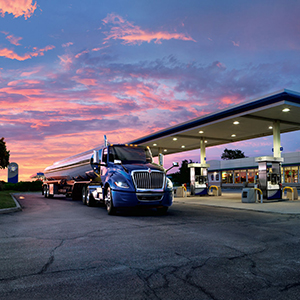
An LT Series Truck. (Navistar International Corp.)
Meanwhile, Charles Freese, GM executive director of global fuel cell business, said in response to a question during the call that the arrangement with Navistar is unique.
“We are in an arrangement with Navistar and OneH2, and we are very excited about that and that is what we are here to talk about today. We have nothing to say about prior agreements other than what has been publicly announced,” he said.
In November, truck maker Nikola Corp. announced it signed a nonbinding memorandum of understanding with GM to integrate the Hydrotec fuel cell system into Nikola’s commercial heavy-duty trucks, which still are under development.
A Nikola spokesperson told TT on Jan. 27 those discussions were “ongoing.”
Navistar spokesperson Bre Whalen told TT that Navistar’s latest partnerships do not impact a project announced in November with Cummins Inc. and Werner Enterprises and $7 million in funding from the U.S. Department of Energy to develop and pilot a fuel cell-powered Class 8.
“To accelerate the adoption of emerging technologies,” Whalen said, “Navistar believes in collaboration without boundaries, which allows the company to assist customers in developing a zero-emissions business model that reduces the carbon footprint in an affordable way.”
Want more news? Listen to today's daily briefing:
Subscribe: Apple Podcasts | Spotify | Amazon Alexa | Google Assistant | More


